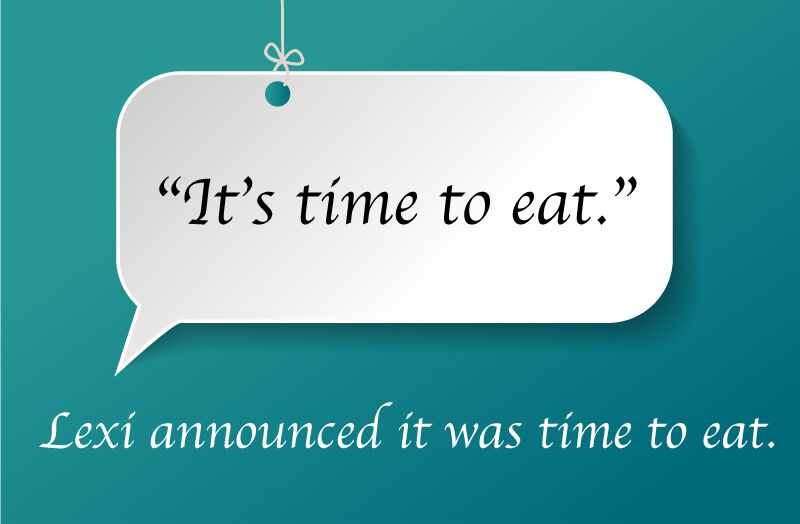Indirect quotations, also called indirect discourse or indirect speech, are a nice shortcut when you're relaying something someone said. They provide a summary and allow you to paraphrase instead of giving a verbatim retelling that may not add anything to your writing.
For example, a direct quotation would look like this:
- Lexi said, "It's time to eat!"
An indirect quotation would look like this:
- Lexi announced it was time to eat.
In this example, there would be little reason to use the direct quotation, you don't lose any of the meaning of the statement by quoting it indirectly.
If you feel like your essay or speech is heavy on direct quotations, change things up with an indirect quotation. Indirect quotations help to strengthen your own point of view, allowing your knowledge or expertise to shine through. They don't overshadow what you have to bring to the table. Rather, they bolster your point while maintaining the original author's meaning.
Formatting Indirect Quotations
The good news is, you only need the basic punctuation you would use in any sentence with indirect quotations. You don't have to worry about what goes inside or outside the quotation marks. For example:
- James made a good point about preparation being the key to success.
- When it comes to creativity, I believe, like Maya Angelou, that you can't use it up.
- I was skeptical when my doctor told me to try yoga for my back pain, but it has really helped.
Do you see how it serves a paraphrasing purpose? A direct quotation can sometimes halt the flow of your writing. With an indirect quotation, your sentence flows on, while you maintain the integrity of the speaker's meaning without using the exact words, and convey solid information in support of your argument.
Attributing Indirect Quotations
While indirect quotations are slightly less formal and stylized than direct quotes, it's still important to attribute the words. Typically, you'll see some sort of lead-in to the quote.
For example:
- According to Albert Einstein, life is like a bicycle. You need to keep moving.
- Albert Einstein observed that life was like a bicycle. You need to keep moving.
- In the words of our beloved Albert Einstein, life is like a bicycle. You need to keep moving.
While providing information about the source, the words you use in the lead-in can also help to signal how you feel about the author or quote. In the examples above the use of "beloved" is very positive, while "observed" and "according to" are neutral. To indicate disagreement you could use "claims" or "alleges," which would ready the readers for your counterargument.
In a situation like this, where you're referencing a popular quote, you wouldn't need to worry about APA or MLA citations. However, if you're referencing a specific portion of an article or textbook, you'll want to use proper citations.
Using Mixed Quotations
To keep your writing interesting and varied, you can throw in mixed quotations. You guessed it, mixed quotations combine direct and indirect quotations. Here's a basic example to help you see what mixed quotations embody:
- All her boyfriends have told me she's "really sweet."
A direct quote would read like this:
- All her boyfriends said, "She's really sweet."
An indirect quote would read like this:
- Her boyfriends always say that she's really sweet.
Mixed quotations almost set the reader up for an indirect quote, and then add quotation marks around the sections that are truly verbatim.
Here's a longer example:
"Military relations with China also are tough," said U.S. Navy Admiral William Fallon, commander of the U.S. Pacific Command. He said he called Chinese counterparts to discuss North Korea's missile tests. (Alwyn Scott, "U.S. May Slap China with Suit in Intellectual-Property Dispute." The Seattle Times, July 10, 2006)
Do you see how direct and indirect quotes can blend together nicely? To a degree, how you cite your sources is up to you. The point is, if you're obviously taking information from someone else's work, you have to give credit where credit is due. Otherwise, you're changing lanes into plagiarism and we all know how that ends.
Solid Reinforcements
Quotations will always be beneficial in essays and speeches. They provide credibility to your statements, show that you engaged in research, and even support any emotions you may be trying to evoke. As long as you choose wisely and properly introduce your quotation, you're doing yourself a favor by beefing up your writing with these solid reinforcements. With your punctuation in check, you'll be well on your way to a well-thought-out piece of writing!
